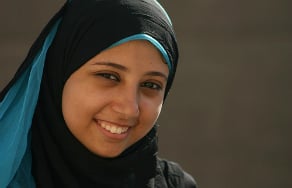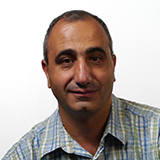
Egyptian blogger and Global Voices Online contributor Noha Atef was in Armenia recently upon the invitation of the Yerevan-based Public Journalism Club. Noha was at one point the editor of the blog Torture in Egypt, but now she’s a junior researcher at the University of Birmingham. Noha describes how during the 2011 Egyptian revolution, every activist had a sms ready in her phone that said “I’ve been arrested.”
How did social media develop in Egypt in recent years?
The first wave of protests began in 2005. Back then, there were a small number of blogs and the common person would not know what is a blog. Internet was there, but wasn’t that common. And the word “blog” was really weird.
When the opposition movements began to stage protests on the streets against the president, these weren’t covered by the mainstream media. So the protestors were covering it — they started to create their own media. So they were uploading pictures and writing news online in Yahoo groups… and then this content was copied to a small number of blogs. And then other people would read the news on the blogs. Gradually they started to blog themselves and blogging started to become a phenomena.
From 2005 to 2008, bloggers were writing on different topics: the political and social taboos were discussed widely on the blogs. What really encouraged people to start their own blogs was the readers. So the number of blogs were growing at this time.
In 2008, Facebook started to come to the scene with this group created by young activists that called for a massive strike on Apr. 6 in solidarity with the tens of thousands of workers striking in the northern Egyptian city of Mahala. The page [on Facebook] became very popular and many members joined quickly — which was intimidating to the Ministry of Interior because if this were an offline group, they would arrest people, but they didn’t know what Facebook is. They really oppressed the city on this day — [people were] not allowed to go in or out. And the police was on every kilometer in this city, and they arrested the people who created the group and made an official statement on TV warning people of striking on this day — which was very good publicity for the day and good publicity for Facebook.
And then Facebook and Twitter started to become preferred more than the traditional blogs because they’re quick and they’re entertaining in a way. [With respect to blogging platforms] WordPress and Tumblr [are used widely in Egypt], but people are more into Twitter.
The Egyptian revolution is often associated with Facebook. What was the role of this social network?
I don’t think Facebook played a role because Facebook is a mere tool. We could say that people made good use of Facebook, and yes, they did to some extent, but we should not overrate this role because eventually, it is one of the media tools of the revolution and the media tools of the revolution were not only digital or online. The role of Facebook and Twitter and so on is extremely overrated by the mainstream media who are just trying to find any exotic story about the revolution.
At the end of the day, we have 17% of the population who are uneducated — they cannot even write their names. And revolution is done by people and if people are not educated, they cannot go online. Almost all countries have access to Facebook, but why do revolutions happen in certain places and not others?
Why?
Because it’s a matter of people not a matter of tools.
And how were people informed of what was happening in the country if mainstream media wasn’t covering the protests? If they weren’t using Facebook, what was the source of their information?
People created their own media. If you remember, during the Egyptian revolution the Internet was shut off. The protestors in Egypt didn’t have Internet and didn’t have mobile services so they connected in a traditional way — they were actually very creative in the way they were communicating. Masses, thousands of people are in the protests, so how they are going to connect and how they are going to organize themselves without having Internet or mobiles or anything…
This is one side and the other side is how they are transforming [i.e. conveying] the news of their actions to the world. It wasn’t easy, but eventually it was an easy job. Nowadays you can find a way other than the Internet [to be heard]; you can be heard [in other ways]… And you cannot give the credits to Facebook and Twitter… it [helped to] some extent but it was not a factor of success.
One of the reasons that Facebook might be so overrated in this case is that many of us remember that after the Egyptian revolution, a newborn was named Facebook.
This is silly news. If you have a child, would you call him Facebook? […] You cannot generalize — it’s just one person who’s called Facebook, if this proved to be true.
What’s the situation now? Have their been great changes in mainstream and social media in Egypt?
No, there haven’t. The state-run media is still working as a propaganda for the Military Council (it used to be a propaganda for the regime)… We have more TV stations nowadays. But again, they’re serving the remnants of the ousted regime and they are broadcasting propaganda, trying to defame the protestors and raise the popularity of the Military Council.
We really have more social media (not [just] the digital media). Yeah, we have more Internet users, but we even have other types of media — like graffiti is really flourishing. We have the puppet shows on the streets; we have different, creative type of media… like operet singing… so we are developing our own media… They used these types of media during and after the Egyptian revolution.
The Military Council is trying to control the media [now], trying to defame the protestors and deny the crimes it committed. So there is a campaign called “Liars” that is taking a projector to the street and going to… the poor places, the places where protestors do not approach, away from the squares. They show documentaries and videos that expose the Military Council, the military crimes. So it’s a direct connection with people and it’s successful.
How do the authorities control the Internet?
We have Internet Police, a special unit in the Ministry of Interior, since the 90s. Officially, it’s [to fight against] internet crime, but also they watch what’s being said online, who’s saying this, [and they try] to spread counter statements to what the opposition is saying.
Have you personally received any threats (as a blogger)?
Before the revolution? Yes, I had. Me and my friends, the core activists of the change, I find that all of us have problems before and after the revolution. Maybe I’m luckier because I’m abroad? So after the revolution I didn’t have that situation, but my friends, they were either sent to prison or physically attacked — I have a friend who lost one of his eyes. Or they were kidnapped. So they have some serious problems after the revolution. And before the revolution, all of us had problems with the state security, starting from fabricating legal cases [against you] or threats and intimidation all the time, job dismissed (you lose your job), family threats (they threaten your family). They were very good at doing these things. I personally had these kinds of problems.
So it’s not safe to be a political blogger in Egypt?
No, it was not, and even Reporters Without Borders has said Egypt is one of the worst countries to become a journalist. [Egypt is also] in the list of internet enemies.
Interview conducted by Gegham Vardanyan


Add new comment
Comments by Media.am readers become public after moderation. We urge our readers not to leave anonymous comments. It’s always nice to know with whom one is speaking.
We do not publish comments that contain profanities, non-normative lexicon, personal attacks or threats. We do not publish comments that spread hate.